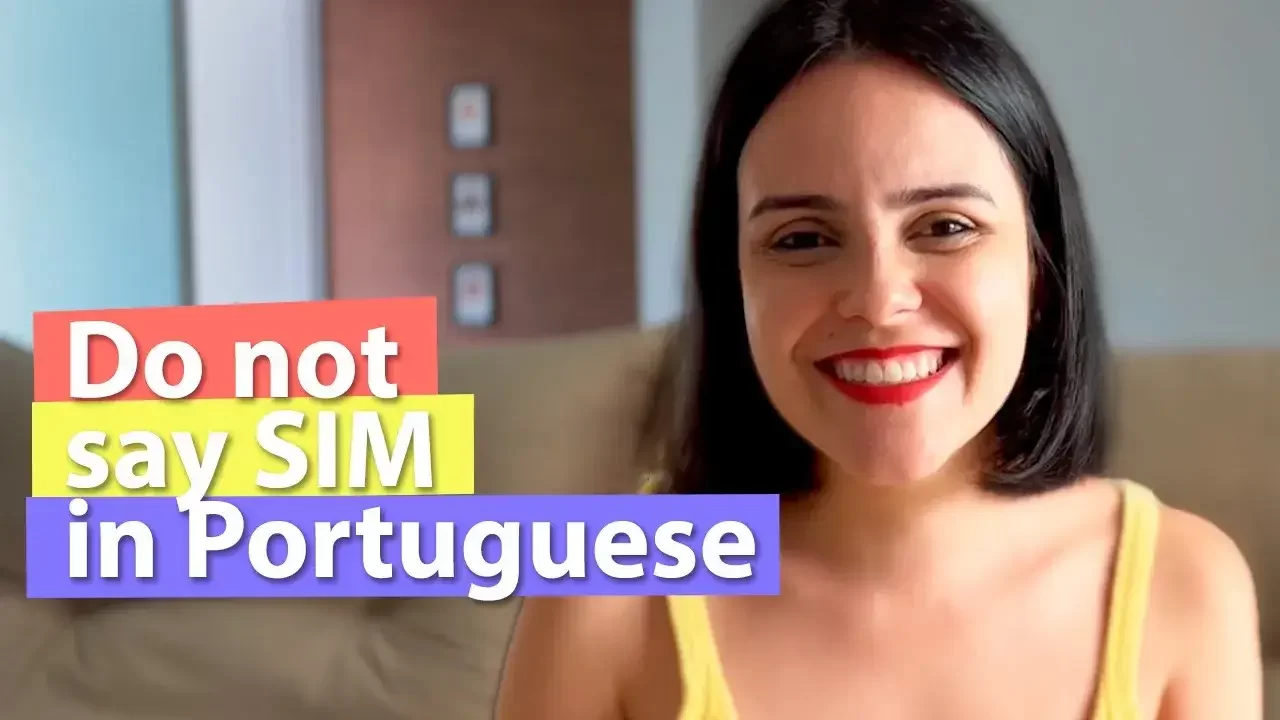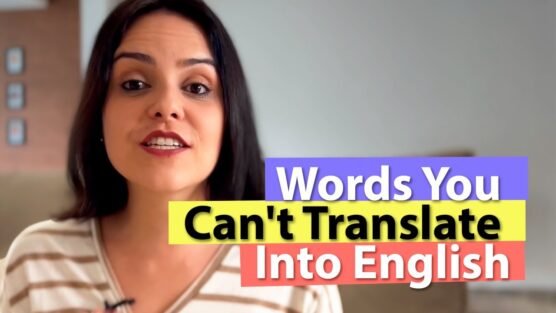Video Transcription
Calma.
É claro que você pode
dizer sim quando você quiser responder
a uma pergunta de forma afirmativa.
Mas a verdade é que nós, brasileiros,
temos uma tendência a responder
perguntas de forma afirmativa,
sem usar a palavra sim.
Quer saber como eu vou te contar tudinho
nesse vídeo bem aqui.
Mas antes de a gente começar
comenta aqui embaixo,
se você já percebeu isso
ouvindo algum brasileiro conversar?
Não usar a palavra
sim para responder de forma afirmativa
é uma característica da comunicação
do dia a dia de nativos do Brasil.
E aí, se você quiser achar bem natural
essa dica de hoje, vai te ajudar bastante.
Agora, se você gosta dos nossos vídeos
e esta curtindo aprender português
bem aqui com a gente,
se inscreve no nosso canal.
É muito importante que você
faça isso para não perder nenhuma aula
e não esquece de clicar no sininho
que está lá na página inicial
para ativar as notificações.
E se os vídeos no YouTube
não são suficientes para você
e você quer algo mais estruturado,
mais organizado, numa sequência lógica,
você pode se inscrever
para o nosso curso completo!
Sim é completo mesmo.
All in one!
Todos os níveis em um único curso.
E isso aí você paga só uma vez e
tem acesso a um curso com todos os níveis.
São mais de 300 aulas gravadas
para você assistir
quando puder e quando quiser,
mas há aulas em grupo toda semana
para praticar conversação
e aulas individuais
para agendar com um professor nativo.
Quando for melhor para você!
O link para o curso está na descrição
desse vídeo bem aqui embaixo.
Então corre, se inscreve!
Bom, vamos começar a aprender as formas
de dizer sim, sem falar sim.
Como eu falei lá no início, dizer sim não
tem nada de errado, muito pelo contrário,
é a forma mais tradicional de responder
uma pergunta de forma afirmativa.
Por exemplo, você gosta de café?
Sim, eu gosto de café.
Porém, o que acontece
é que respostas como sim, eu gosto de café
podem soar muito artificiais, tipo aquelas frases
dos livros de gramática de português, sabe?
E quando a gente quer falar uma língua, tudo o que a gente não quer
é soar artificial e muito menos parecer um robô falando, né
A gente quer falar com
naturalidade, especialmente em conversas coloquiais
com os nossos amigos, com nosso namorado
ou namorada, com nossa família, enfim,
com as pessoas que são mais próximas
a nós.
Um jeito muito comum
e que soa mais natural
e responder perguntas em português
de forma afirmativa,
é usar o verbo que foi usado na pergunta.
Por exemplo, na pergunta
Você gosta de café?
Poderíamos responder apenas com: Gosto!
Tava ou eu tava
Você tem Instagram?
Eu tenho ou só tenho.
Ela veio aqui semana passada?
Veio.
Eu posso te ligar amanhã?
já nos indicam que é um verbo
de primeira pessoa ou de terceira pessoa,
ou seja, que é conjugado com o pronome
eu e ela com pronome você.
Outra forma de
responder uma pergunta de forma afirmativa
sem usar o sim é usando o pronome isso.
Usamos o pronome isso muitas vezes
para confirmar uma informação.
Por exemplo,
você é formado em jornalismo, né?
Isso!
Mas o uso do isso é mais comum.
Quando a gente aponta para alguma coisa,
por exemplo:
É isso aqui que você quer?
Isso!
Então a gente está confirmando.
Também podemos usar a palavra
já ao invés de sim,
especialmente quando a pergunta é
sobre alguma coisa que vivemos
ou experimentamos no passado.
Então, vamos ver os exemplos.
Você já foi ao Brasil?
Já, duas vezes.
Você já está indo embora?
Já! , está tarde.
Vamos ver mais alguns exemplos.
Você vai para a festa hoje? Vou!
Ela tem mais de um irmão?
Tem! Vai
ter live do Yes Portuguese
essa semana? Vai!
Ontem foi seu aniversário? Foi!
Você já assistiu esse filme? Já!
Eles não fizeram uma festa na semana
passada?
Fizeram.
Você já tinha completado 30 anos? Já!
Nós passamos por lá mês passado?
Passamos.
Amanhã a aula começa mais cedo?
Começa!
Ele gosta de caipirinha?
Gosta. Viu?
Muito bem.
Você viu agora 10 exemplos
e agora você já sabe como responder
perguntas de forma afirmativa,
sem usar a palavra? Sim.
Eu, por exemplo,
respondo muita coisa com sim.
É um costume meu
e não deixo de ser brasileira por isso.
Então, minha dica é conheça tudo
o que você puder sobre a língua.
Mas, quando for possível, fale da forma
que você se sentir mais confortável.
Beleza?
Então,
até a nossa próxima dica,
até o próximo vídeo.
Um abraço. Tchau, tchau!
Calm.
of course you can
say yes when you want to answer a question in the affirmative.
But the truth is that we Brazilians tend to respond
questions affirmatively, without using the word yes.
Want to know how I’m going to tell you everything
in this video right here.
But before we start, comment below,
have you ever noticed this listening to a Brazilian talking?
Do not use the word yes to answer in the affirmative
is a feature of communication
of the daily life of natives of Brazil.
So, if you want to find it very natural
This tip today will help you a lot.
Now, if you like our videos and are enjoying learning Portuguese
right here with us, subscribe to our channel.
It’s very important that you do this so you don’t miss any classes.
and don’t forget to click on the bell on the home page
to enable notifications.
And if YouTube videos aren’t enough for you
and you want something more structured, more organized, in a logical sequence,
you can sign up for our full course!
Yes it is complete.
All in one!
All levels in a single course.
And that’s when you pay only once and have access to a course with all levels.
There are more than 300 recorded classes for you to watch
when you can and when you want,
but there are group classes every week to practice conversation
and individual classes to schedule with a native teacher.
When it’s best for you!
The link to the course is in the description of this video right below.
So run, sign up!
Well, let’s start learning ways to say yes without saying yes.
As I said at the beginning, saying yes is not wrong, quite the opposite,
is the more traditional way of answering a question in the affirmative.
For example, do you like coffee?
Yes, I like coffee.
However, what happens is that answers like yes, I like coffee
can sound very artificial, like those phrases
from Portuguese grammar books, you know?
And when we want to speak a language, everything we don’t want
it’s sounding artificial and much less sounding like a robot talking, right?
we want to talk to
naturalness, especially in conversational conversations
with our friends, with our boyfriend
or girlfriend, with our family, anyway,
with the people who are closest to us.
So how do you do it?
A very common and natural-sounding way
and answer questions in Portuguese in the affirmative,
is to use the verb that was used in the question.
For example, in the question Do you like coffee?
We could just respond with: I like it!
Let’s see other examples and there are several.
Were you at the party yesterday?
Was or was I
Are you on Instagram?
I have or just have.
Did she come here last week?
He came.
Can I call you tomorrow?
He can.
Note that the use of the pronoun is optional.
Verb ending and conversation context
already indicate to us that it is a first person or third person verb,
that is, it is conjugated with the pronoun eu and she with the pronoun you.
another way of
answer a question in the affirmative
without using the yes is using the pronoun this.
We use the pronoun it many times to confirm information.
For example, you have a degree in journalism, right?
This!
But the use of this is more common.
When we point to something, for example:
Is this what you want?
This!
So we are confirming.
We can also use the word already instead of yes,
especially when the question is about something we live
or experienced in the past.
So, let’s see the examples.
Have you ever been to Brazil?
Yes, twice.
Are you leaving already?
Already! , this afternoon.
Let’s see some more examples.
Are you going to the party today? I will!
Does she have more than one brother?
Have! Go
have Yes Portuguese live this week? Go!
Yesterday was your birthday? Was!
Have you ever watched this movie? Already!
Didn’t they have a party last week?
Made.
Were you already 30 years old? Already!
Did we go there last month?
We passed.
Does class start early tomorrow?
Begins!
Does he like caipirinha?
He likes. Saw?
Very good.
You have now seen 10 examples and now you know how to answer
questions in the affirmative, without using the word? Yes.
But if you want to answer using yes, that’s not a problem either.
I, for example, answer a lot of things with yes.
It’s a custom of mine and I don’t stop being Brazilian for that.
So, my tip is to know everything you can about the language.
But, when possible, speak the way you feel most comfortable.
Beauty?
Then,
until our next tip, until the next video.
A hug. Bye Bye!
Hey,
o que você achou deste conteúdo? Conte nos comentários.





